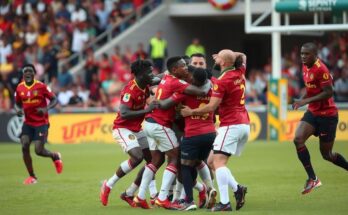Nigeria’s football team reports being stranded in Libya with no basic provisions, prompting player Wilfred Ndidi to claim they are being held “hostage”. Their charter flight was redirected, leading to prolonged waits without food or communication, as they prepare for an Africa Cup of Nations qualifier against Libya, amidst escalating tensions regarding treatment between the two teams.
Nigeria’s national football team is embroiled in a crisis as they claim to be stranded at an airport in Libya, leading Premier League player Wilfred Ndidi to express that the team feels they are being held “hostage”. This situation arises as Nigeria prepares for an Africa Cup of Nations qualifier against Libya, following their recent victory over them on home ground. Reports indicate that their chartered flight was diverted to Al-Abraq Airport without explanation, where players were left without food, drink, or connectivity for over 12 hours. Team captain William Troost-Ekong and several others have denounced the treatment, suggesting that they may refuse to participate in the upcoming match. The tension stems from allegations of poor treatment by both sides during previous encounters, with Nigeria’s officials rejecting Libya’s complaints regarding their handling of the visiting team. With the team’s morale affected and safety concerns in focus, the viability of the upcoming fixture remains uncertain.
The incident emerges in the context of the Africa Cup of Nations qualifiers between Nigeria and Libya, a competition showcasing the teams’ pursuit of qualification for the prestigious tournament scheduled for 2025. Nigeria’s Super Eagles recently achieved a significant win over Libya, thereby solidifying their position in the group. The current crisis reflects deeper issues related to travel logistics and treatment of sports teams in the region, magnifying the complexities faced by African football associations. Accusations of mistreatment by both teams highlight the ongoing struggles within the realm of international football competition in Africa, prompting calls for intervention by governing bodies such as the Confederation of African Football (CAF).
In conclusion, the plight of Nigeria’s football team, as they face dire conditions in Libya, raises serious concerns regarding the treatment of sports teams in international competitions. Wilfred Ndidi and William Troost-Ekong have vocally expressed their dissatisfaction, suggesting they may boycott the upcoming match unless the situation is rectified. This incident not only affects the morale of the players but also casts a shadow over the organization of the Africa Cup of Nations qualifiers, necessitating urgent attention from football authorities to ensure fair play and safety.
Original Source: www.dailymail.co.uk



